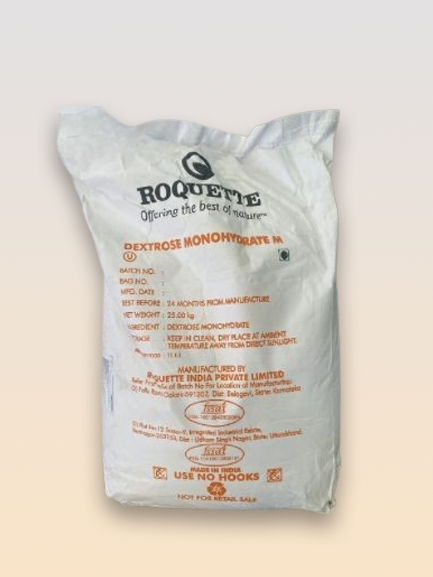Your Trusted Partner in Manufacturing, Imports & Bulk Supply

Dextrose Monohydrate
Dextrose Monohydrate is a sugar naturally found in the body which is produced by wringing corn starch or other carbohydrate sources. It is the 1-Hydrate of D-Glucose and has a chemical formula of C₆H₁₂O₆·H₂O, which refers to a compound that contains one molecule of water of
crystallization, therefore making it a crystalline powder that is readily soluble in water with a mild sweetness. The extensively applied simple sugar found in multiple industries such as food, pharma, and agriculture, owing to its energy-donating role and being a reducing sugar.
Benefits
- Natural Sweetener
- The source of sweetness is natural and has lower caloric content than some other sugars.
- High Solubility
- It is highly soluble in water, making it a great option for liquid formulations and solutions.
- Energy Source
- Fast and effective energy supplier in forma like Animal feed and sports supplements.
- Non-Toxic and Safe
- Considered safe for consumption or use in food, pharmaceuticals and cosmetics, and many other applications.
- Versatile
- Acts as a sweetener, humectant, bulking agent and fermentation substrate, can be used in a variety of applications.

Uses
- Food and Beverage Industry
- Sweetener: For confectionery, bakery products, jams and jellies.
- Energy Drink: Fast Energy in Sports and Nutrition Drinks
- Preservative: Keep product feeling fresh, lower the water activity so the bacteria cannot grow.
- Fermentation: Used as a fermentation substrate in brewing, production of vinegar, and other food processes.
- Pharmaceutical Industry
- Intravenous Solutions: Administered through IV fluids for replenishment energy and hydration.
- Tablet Formulations: It functions as a binder and excipient to compose a tablet.
- Energy Supplements: Contained in medical nutrition products for quick energy supply.
- Cosmetics and Personal Care
- Humectant: Holds onto water inside skin products, increasing moisture.
- Exfoliant: Because of its gentle nature it is used in scrubs and other exfoliating formulations.
- Animal Feed Industry
- Quick Energy Source: It is often included in livestock feed for providing quick and easily digestible energy to animals.
- Palatability Enhancer: Enhances flavor of feed to promote animal consumption.
- Chemical Industry
- Fermentation Processes– Utilized for the manufacture of ethanol, lactic acid, and citric acid.
- Polyols and Biopolymers: Serves as a substrate for the synthesis of numerous biopolymers and chemicals.
- Biotechnology and Research
- Microbial Culture Media: Provides energy in culture media for the growth and research of micro-organisms.
- Bioplastic Production: Involved in deriving biodegradable plastics and biochemicalss

